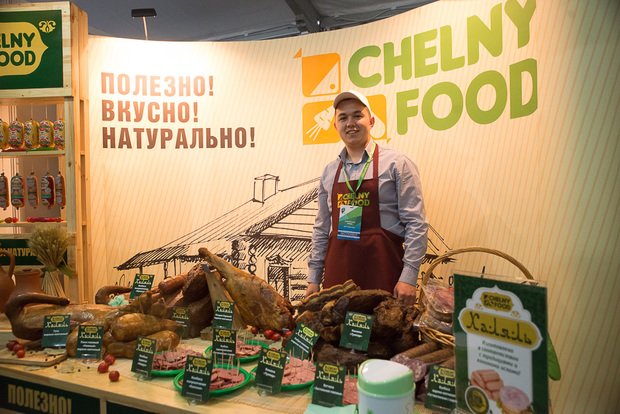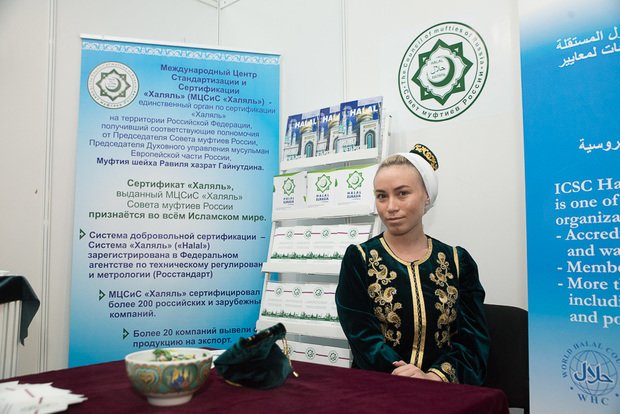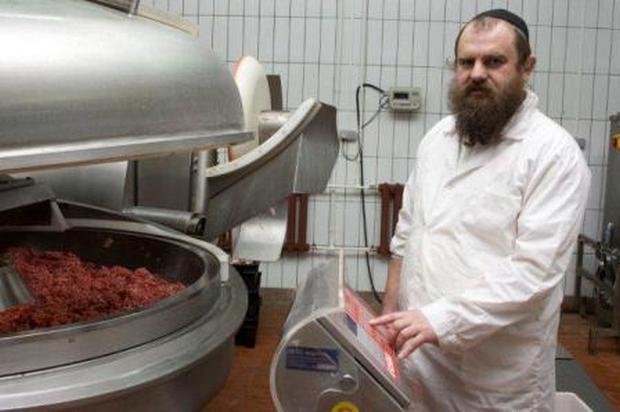On religious feelings: how businesses make money on Lenten, kosher and halal
Great Lent is continuing in Russia. Although it does not require people to buy any special products, it gives a large scope for marketers. How the Lent as well as the traditions of representatives of other religions affect the sales of Russian goods and how great the potential of Lenten, kosher and halal products is — read in the material of Realnoe Vremya.
Ten percent of Russians, according to VTsIOM's [Russian Public Opinion Research Center] polls, are going to go on a fast, however, only 3-4% of Russians declare full observance of lean diet annually. In any case, we are talking about millions of people who, for religious reasons or the desire to make food more healthy, change their eating habits. Representatives of retail chains state that the consumption of lean products grows by 10% annually, according to Rossiyskaya Gazeta, and manufacturers claim an increase in sales of those products that are marked 'Lenten' by about half. In the first half of 2017, sales of lean mayonnaise in Russia increased by 17%, according to Nefis-Bioproduct, and in many respects this is the merit of Great Lent.
As noted by retailers, during fasting it is observed a surge in sales of cereals, confectionery, fish and seafood. As for halal products, there is a steady demand, without seasonal fluctuations, so manufacturers largely rely on it. The exact number of potential buyers of halal products is not established — it is a debatable question: according to various experts, the Muslim population in Russia ranges from 14 to 20 million people (actual official statistics are not available, the data of the 2002 census indicate 14,5 million Muslims).
Describing the market volume, experts also differ greatly in their estimates. For example, Minister of Agriculture and Food of Tatarstan Marat Akhmetov spoke about 100 billion rubles in Tatarstan alone within the framework of Kazansummit 2016. According to the monitoring by the Committee for Halal Standard of the Republic of Tatarstan, in Russia the production of halal products increases by 30-40% annually.

At the same time, the volume of world halal market, according to RBK, has already reached 2,1 trillion dollars in 2017, and the growth continues. Experts have no doubt that the Russian market follows global trends — representatives of one or another religion are increasingly beginning to use the 'right' food.
Besides, the halal certification allows manufacturers to enter the markets abroad. At any rate, this can be said for sure about the poultry market, whose players are in a state of fierce domestic competition.
''Cherkizovo Group has recently obtained an ESMA certificate, which gives the right to sell halal products in the Persian Gulf countries (the estimated volume is more than 10,000 tonnes of meat annually). In 2017, a similar certificate was obtained by Damate Group, specializing in turkey meat (estimated volume of supplies — about 6,000 tonnes a year). Miratorg has announced the beginning of supplies of halal beef to the Gulf countries. Besides, the halal holding has exported poultry since 2016,'' said Yelena Gulenkina, the marketing director of the group of companies Zdorovaya Ferma, a large agricultural holding in the Urals producing poultry, eggs, meat delicacy and convenience food.
According to her, in total there are about 14 leading producers of poultry meat, producing halal products on the market. Most of them (11 companies) use the halal development strategy as a product line under the umbrella brand.

Collegues in the industry from Tatarstan confirm that halal certification is a great competitive advantage.
''For us, it is a priority direction in the development of poultry farming in the agricultural holding because annually we produce up to 12,000 tonnes of products that meet all the requirements of Islam. We registered an increase in sales of halal meat products by 12% in 2017 compared to 2016. Since the beginning of 2018, the share of sales of halal products in the meat range has already shown an increase of 16%,'' says Anastasia Dobrokhotova, the sales director at GC Agrosila Group (the company Chelny Broiler, part of the holding, is considered the largest supplier of halal products in the region and sells products including outside the Volga Federal District — in Moscow and Yekaterinburg). Besides, in 2017 the company conducted a survey among customers, which revealed a clear need for dairy halal assortment. For this reason, in 2018 the holding company launches trial sales in this area.
Certification adds 5-7% to the price
Halal certification in Russia is voluntary, it is issued in committees or centres for halal standard, established by the Muslim Spiritual boards. They not only issue a certificate, but also carry out the audit with the right to revoke a certificate if the rules of halal are violated.
The two main certifying bodies are the Committee for Halal Standard of the Republic of Tatarstan (at MSB RT) and the International certification center Halal (located in Moscow).
''The certification audit is carried out by experts of the International standardization and certification center Halal with the full control of production facilities, technical documentation, the programmes of production control, quality management systems and food safety developed and implemented at the enterprise. A certificate does not mean that the manufacturer, having proved himself well during the audit, is now free to do anything. For example, in meat processing plants throughout the production cycle — starting from butchering and ending with packing — there is an independent expert strictly controlling the execution of the requirements of the standard HALAL-PPT-SMR and issuing a certificate of conformity for each batch of finished products,'' says an expert of the International standardization and certification center Halal.
The center does not disclose how much the certification costs, but the main costs are not the cost of the certificate, but the features of production organization, so halal products are usually more expensive than conventional by 5-7%.

''In addition to costs for certification, the company is obliged to invest more in the production process: meat loses 5% of body weight at halal slaughtering; manual labour by definition is more expensive than machine one; feed for growing halal chickens is only natural, without stimulant components, respectively, more expensive,'' says Yelena Gulenkina.
Most often, manufacturers produce halal products under the main brand, limiting themselves to appropriate marking: the halal sticker is often enough for the buyer to make a choice in favour of such product. At the same time, it is a scope for profanation, and there are such cases, say the interlocutors of Realnoe Vremya.
''There have been cases when manufacturers that obtained a halal certificate performed slaughtering of animals with the help of automatic line or used feed with forbidden components. On the other hand, there are also companies that by their principles and consciously refuse to produce halal because they understand that they are not ready to produce the product really meeting the Islam norms. It is the issue of corporate, social and personal culture of owners,'' said Yelena Gulenkina.

Who wants kosher beer?
But if the potential of the halal market with billion volumes has long been understood by both large holdings and small businesses, the market of kosher goods is developing quite differently. In the registry of the Department of kashrut at the Main Rabbinate of Russia, there are at least a dozen brands in each product category of producers who passed the voluntary certification. Here are producers of teas, canned food, sauces, and even vodka and beer.
First of all, Russian productions are gone through toiveling for export (and then it is the real interests of business) or by religious beliefs of the owners of the companies (like in the case of Ramensky meat processing plant, which is the only major producer of kosher meat in Russia and which created the separate brand Elyon for this purpose).
''The availability of the certificate of kashrut gives us the opportunity to sell our products in kosher stores and major retail chains in Israel, such as Yochananof, Zolvebegadol, Coop Israel, Super-bareket, Yenot bitan, Super yehoda, Ampm, Hazi hinam, and to reorient sales in Israel from the Russian-speaking emigrant niche to wider circles of consumers. The entire range of products under the brand name Baltika, Zatecky Gus, the kvass Khlebny Kray, Zhiguli can be found in Israel in all major cities of the country: Jerusalem, Tel Aviv, Netanya, Ashdod, Eilat and so on,'' says Yelena Volgusheva, the export sales director at the brewing company Baltika. The main markets for kosher products is Israel and the United States. Israel is the largest beer market in the Middle East, where the share of Baltic is more than 50% of all Russian beer exports.
In Russia, the market for kosher products has not been formed yet, they consider in the network of shops Kosher Gourmet.
 ''We can talk about the presence of the market in Moscow, St. Petersburg, where there are large Jewish communities. We are the biggest wholesale buyer here, but 70% of the company's range is formed from imported goods,'' says the owner of the network Ilan Ostrobrod.
''We can talk about the presence of the market in Moscow, St. Petersburg, where there are large Jewish communities. We are the biggest wholesale buyer here, but 70% of the company's range is formed from imported goods,'' says the owner of the network Ilan Ostrobrod.
However, the positive dynamics is obvious, he believes:
''We opened the first store three years ago, in the midst of the crisis, and some of the products could not even be imported in the country because of the sanctions and a high price of the dollar. Despite this, we have recently entered the market of St. Petersburg, and we are thinking about continuing our work in other regions, primarily in Yekaterinburg. We see that the number of consumers is growing both at the expense of Jews, and at the expense of representatives of other faiths or unbelieving people who like the range and who consider kosher production a priori qualitative.''
The certification, like in the case of halal goods, is voluntary. However, in practice, the manufacturer is unlikely to enjoy trust in the community if they do not obtain a certificate in the Department, says Ilan Ostrobrod. The scope for profaning in kosher products is not large — the community is more close-knit, and information about any violations very quickly gets spread.